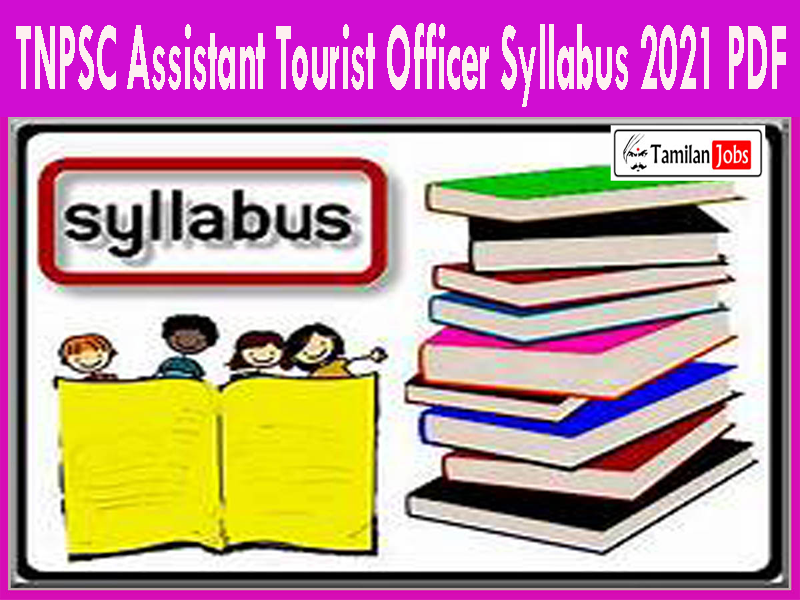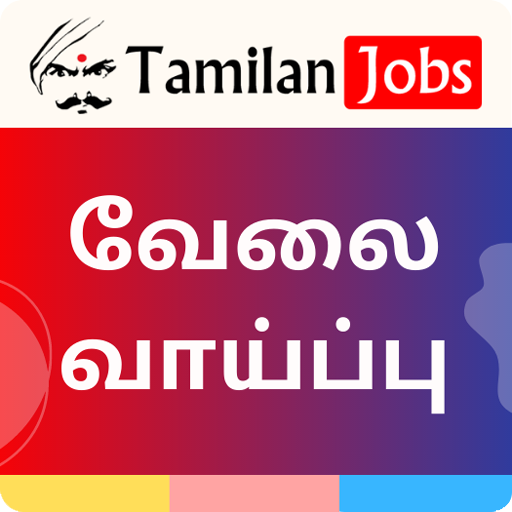TNPSC Assistant Tourist Officer Syllabus 2021 PDF & Download ATO Exam Pattern: Are you searching for TNPSC Assistant Tourist Officer Syllabus? If Yes, You are in the right place. Tamilnadu Public Service Commission (TNPSC) has officially released the Assistant Tourist Officer (ATO) post Recruitment. The candidates eagerly check and prepare for the examination. So, we provided the TNPSC Assistant Tourist Officer Syllabus 2021 PDF to score more marks in the TNPSC Assistant Tourist Officer Exam. Not only the TNPSC ATO Syllabus pdf you can also get the TNPSC Assistant Tourist Officer Exam Pattern from this page. So, candidates can prepare for the TNPSC ATO Exam 2021 without any disturbance. To the bottom of this page, you can easily get the TNPSC Assistant Tourist Officer Syllabus 2021 in PDF & Exam Pattern for Subject Wise Syllabus in PDF Format. The candidates can use this article to get more marks and ideas about the examination.

TNPSC Assistant Tourist Officer Syllabus 2021 – Details
| TNPSC Assistant Tourist Officer Syllabus 2021 PDF & Download ATO Exam Pattern | |
|---|---|
| Organization Name | Tamilnadu Public Service Commission (TNPSC) |
| Post Name | Assistant Tourist Officer (ATO) |
| Category | Syllabus |
| Syllabus | Released |
| Job Location | Tamilnadu |
| Official website | www.tnpsc.gov.in |
TNPSC Assistant Tourist Officer Selection Process 2021
- Main Written Examination
- Certificate Verification
TNPSC Assistant Tourist Officer Exam Pattern 2021
| S.no | Name of paper | No.of.Items | Marks | Duration |
| 1 | Travel & Tourism | 200 | 300 | 3 Hours |
| 2 | General Studies | 100 | 200 | 2 Hours |
| 3 | Total Marks | 500 | ||
| 4 | Minimum Qualifying Marks | 150 | ||
TNPSC ATO Syllabus 2021 PDF Download
Paper 1: Travel & Tourism (Objective Type)
Unit – I: PRINCIPLES AND PRACTICES OF TOURISM:
Introduction to tourism- Meaning and Scope, Concept, Components, and types of Tourism – Emerging trends- Evolution of Tourism in India- Ministry of TourismGovernment of India – Department of Tourism – Government of Tamil Nadu.
UNIT- II: TOURISM PRODUCTS OF INDIA
Unique features of Tourism Products- Tourist attraction Hills/ Beaches/ Mountains/ WaterBodies- Forts/ Palaces/ Fairs and festivals/Folk dances/Dance /Music/-Art and craft temples/Churches/ Mosque and other religious worship places- UNESCO World Heritage sites- Flora and Fauna- Major wildlife sanctuaries and National parks- Major Tourist Circuits of India- Land, Air and Water-based adventure activities, Guidelines and Regulations -Ancient Monuments Preservation Act 1904- Ancient Monuments and Archaeological Site and Remains Act 1958.
UNIT – III: TRANSPORT
History- Land-Water and Air- Air Industry / Airlines in India/ Functions/ Present policies-Air
Charters- Growth of Road Transport – Indian Road Network – Major rail network of Indiatypes of Rail Tours in India- Water Transport- History and Development-Historical PastCruise ships-Ferries- Hovercraft- River and Canal boats- Boat Houses.
UNIT- IV: ACCOMMODATION OPERATIONS
Origin and growth of hotels- Classification of Hotels on the basis of Size, Location,
Facilities, Plan, Service and Ownership- Allied Catering services- Supplementary
Accommodation- House Keeping- Front Office Management- Booking procedures- Types
of Food and Beverages.
UNIT-V: TOURISM MARKETING
Unique features of Tourism Marketing – Market Segmentation- Marketing mix- tourists
behaviour- Distribution channel and its characteristics- Market research- Market forecast marketing Promotions- Tools of Promotion- E-Marketing- Domestic and International
Travel Marts- Branding of Tourism products- “Incredible India” Campaign- “Enchanting
Tamil Nadu: Experience yourselves”- Swachh Bharat Abhiyan- Destination Life Cycle.
UNIT-VI: TOURISM POLICY AND PLANNING
Need and Objectives of Tourism Policy-John Sargeant Committee- L.K.Jha Committee
(Ad-hoc Committee) – 1963, National Tourism Policy -1982, Yunus committee 1988-
Tourism Finance Corporation of India, National Action Plan on Tourism – 1992- National
Tourism Policy-2002 – Tourism in Five-year plans- Tourism policies of Tamil Nadu.
UNIT-VII: FUNCTIONS OF TRAVEL AGENCY AND TOUR OPERATION
Tour Operation Procedures – Tour Package – Itinerary preparation- Tour Costing- Travel
formalities – Passport/ VISA /Health Regulations/ Travel insurance/ Customs Clearance/
Foreign Exchange formalities – Baggage rules.
UNIT- VIII: TOURISM GEOGRAPHY
Physical Geography of India- Climate- Sub continent-River system-Mountains- Plains –
Political Geography of India- World Time zone, GMT- India Time Zone.
UNIT-IX: TOURISM ORGANIZATIONS
Organisation and Functions of WTO, ICAO, IATA, PATA, TAAI, IH &RA, SIHRA, FHRAI,
NTO.
UNIT-X: IMPACT OF TOURISM
Positive and negative- Socio-Cultural and Economic Impact – Physical / Environmental
Impact: Earth Summits.
Paper 2: General Studies (Objective Type)
UNIT– I: GENERAL SCIENCE
Physics: Universe – General scientific laws – Scientific instruments – Inventions and
discoveries – National scientific laboratories – Science glossary – Mechanics and properties
of matter – Physical quantities, standards and units – Electricity and magnetism –
Electronics and communication – Heat, light and sound – Atomic and nuclear physics –
Solid State Physics – Spectroscopy – Geophysics – Astronomy and space science.
Chemistry: Elements and Compounds – Acids, bases and salts – Oxidation and reduction
– Chemistry of ores and metals – Carbon, nitrogen and their compounds – Fertilizers,
pesticides, insecticides – Biochemistry and biotechnology – Electrochemistry – Polymers
and plastics.
Botany: Main Concepts of life science – The cell-basic unit of life – Classification of living
organism – Nutrition and dietetics – Respiration – Excretion of metabolic waste –
Bio-communication.
Zoology: Blood and blood circulation – Endocrine system – Reproductive system –
Genetics the science of heredity – Environment, ecology, health and hygiene,
Bio-diversity and its conservation – Human diseases, Prevention and remedies –
Communicable diseases and non-communicable diseases – Alcoholism and drug abuse –
Animals, plants and human life.
UNIT-II: CURRENT EVENTS
History: Latest diary of events – National – National symbols – Profile of States – Defence,
national security and terrorism – World organizations – Pacts and summits – Eminent persons & places in the news – Sports & games – Books & authors – Awards & honours – Cultural panorama – Latest historical events – India and its neighbours – Latest terminology
– Appointments – Who is who?
Political Science: India’s foreign policy – Latest court verdicts – Public opinion – Problems in conduct of public elections – Political parties and political system in India – Public awareness & General administration – Role of Voluntary organizations & Govt., – Welfare oriented govt. schemes, their utility.
Geography: Geographical landmarks – Policy on environment and ecology.
Economics: Current socio-economic problems – New economic policy & Govt. Sector.
Science: Latest inventions on science & technology – Latest discoveries in Health Science
– Mass media & communication.
UNIT–III: GEOGRAPHY
Earth and Universe – Solar system – Atmosphere, hydrosphere, lithosphere – Monsoon, rainfall, weather and climate – Water resources – Rivers in India – Soil, minerals & natural resources – Natural vegetation – Forest & wildlife – Agricultural pattern, livestock & fisheries – Transport & communication – Social geography – Population-density and distribution – Natural calamities – Disaster management – Climate change – Impact and consequences – Mitigation measures – Pollution Control.
UNIT-IV: HISTORY AND CULTURE OF INDIA
Pre-historic events – Indus valley civilization – Vedic, Aryan and Sangam age – Maurya dynasty – Buddhism and Jainism – Guptas, Delhi Sultans, Mughals and Marathas – Age of Vijayanagaram and the brahmans – South Indian history – Culture and Heritage of Tamil people – Advent of European invasion – Expansion and consolidation of British rule – Effect of British rule on socio-economic factors – Social reforms and religious movements – India since independence – Characteristics of Indian culture – Unity in diversity – race, colour, language, custom – India-as secular state – Organizations for fine arts, dance, drama, music – Growth of rationalist, Dravidian movement in TN – Political parties and populist schemes- Prominent personalities in the various spheres – Arts, Science, literature and Philosophy – Mother Teresa, Swami Vivekananda, Pandit Ravishankar, M.S.Subbulakshmi, Rukmani Arundel and J.Krishnamoorthy etc.
UNIT-V: INDIAN POLITY
Constitution of India – Preamble to the constitution – Salient features of constitution -Union, State and territory – Citizenship – Rights amend duties – Fundamental rights -Fundamental duties – Human rights charter – Union legislature – Parliament – State executive – State Legislature – Assembly – Status of Jammu & Kashmir – Local government – Panchayat raj – Tamil Nadu – Judiciary in India – Rule of law/Due process of law – Indian federalism – Centre-state relations – Emergency provisions – Civil services in India – Administrative challenges in a welfare state – Complexities of district administration – Elections – Election Commission Union and State – Official language and Schedule VIII – Amendments to constitution – Schedules to constitution – Administrative reforms & tribunals – Corruption in public life – Anti-corruption measures – Central Vigilance Commission, Lok-adults, Ombudsman, Comptroller and Auditor General of India – Right to information – Central and State Commission – Empowerment of women – Voluntary organizations and Public grievances redressal – Consumer protection forms.
UNIT- VI: INDIAN ECONOMY
Nature of Indian economy – Need for economic planning – Five-year plan models-an assessment – Land reforms & agriculture- Application of science in agriculture -Industrial growth-Capital formation and investment-Role of public sector & isinvestmentDevelopment of infrastructure- National income – Public finance & fiscal policy- Price policy & public distribution – Banking, money & monetary policy – Role of Foreign Direct Investment (FDI) – WTO-globalization & privatization – Rural welfare oriented programmes- Social sector problems – population, education, health, employment, poverty – HRD – sustainable economic growth – Economic trends in Tamil Nadu – Energy Different sources and development – Finance Commission – Planning Commission – National Development Council.
UNIT-VII: INDIAN NATIONAL MOVEMENT
National renaissance – Early uprising against British rule – 1857 Revolt – Indian National
Congress – Emergence of national leaders – Gandhi, Nehru, Tagore, Netaji – Growth of
militant movements – Different modes of agitations-Era of different Acts & Pacts – World
war & final phase struggle – Communalism led to partition – Role of Tamil Nadu in freedom
struggle – Rajaji, VOC, Periyar, Bharathiar & Others – Birth of political parties / political
system in India since independence.
UNIT- VIII: APTITUDE & MENTAL ABILITY TESTS
Conversion of information to data – collection, compilation and presentation of data -tables, graphs, diagrams – Parametric representation of data – Analytical interpretation of data – Simplification – Percentage – Highest Common Factor (HCF) – Lowest Common Multiple (LCM) – Ratio and Proportion – Simple interest – Compound interest – Area –Volume – Time and Work – Behavioral ability – Basic terms, Communications in information technology – Application of Information and Communication Technology (ICT) – Decision making and problem-solving.
Logical Reasoning: Puzzles – Dice – Visual Reasoning – Alphanumeric reasoning –
Number Series – Logical Number / Alphabetical / Diagrammatic Sequences.
Candidates keep in touch with the TAMILANJOBS website for more information regarding Jobs, Exams, results and other details.

